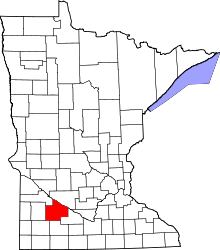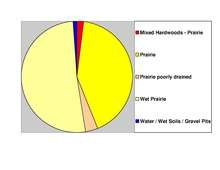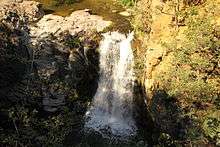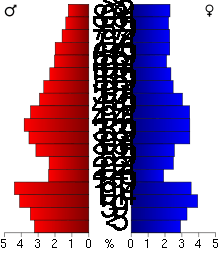Redwood County, Minnesota
| Redwood County, Minnesota | |
|---|---|
 Location in the U.S. state of Minnesota | |
 Minnesota's location in the U.S. | |
| Founded | February 6, 1862[1] |
| Named for | Redwood River[2] |
| Seat | Redwood Falls |
| Largest city | Redwood Falls |
| Area | |
| • Total | 882 sq mi (2,284 km2) |
| • Land | 879 sq mi (2,277 km2) |
| • Water | 3.2 sq mi (8 km2), 0.4% |
| Population (est.) | |
| • (2015) | 15,471 |
| • Density | 18/sq mi (7/km²) |
| Congressional district | 7th |
| Time zone | Central: UTC-6/-5 |
| Website |
www |
Redwood County is a county located in the U.S. state of Minnesota. As of the 2010 census, the population was 16,059.[3] Its county seat is Redwood Falls, located along the Redwood River near its confluence with the Minnesota River.[4] The largely rural area is devoted to commodity crops of corn and soybeans.
The Lower Sioux Indian Reservation (also known as the Mdewakankton Tribal Reservation) is entirely within the county, along the southern bank of the Minnesota River in Paxton and Sherman townships. In the 2000 census, it had a population of 335 persons.
Geography
According to the U.S. Census Bureau, the county has a total area of 882 square miles (2,280 km2), of which 879 square miles (2,280 km2) is land and 3.2 square miles (8.3 km2) (0.4%) is water.[5]


The Redwood River flows through the county to its confluence with the Minnesota River downstream of the county seat of Redwood Falls.
Lakes
- Daubs Lake: in Vail Township
- Gales Lake: mostly in Gales Township, but the northern part is in Westline Township
- Lake Francis: mostly in Westline, but the eastern part is in Granite Rock Township
- Long Lake: in Swedes Forest Township
- Three Lakes: in Three Lakes Township
- Tiger Lake: in Honner Township
- Lake Redwood: in Redwood Falls, Redwood Township, Minnesota
Major highways
 U.S. Highway 14
U.S. Highway 14 U.S. Highway 71
U.S. Highway 71 Minnesota State Highway 19
Minnesota State Highway 19 Minnesota State Highway 67
Minnesota State Highway 67 Minnesota State Highway 68
Minnesota State Highway 68 Minnesota State Highway 330
Minnesota State Highway 330
Adjacent counties
- Renville County (northeast)
- Brown County (east)
- Cottonwood County (south)
- Murray County (southwest)
- Lyon County (west)
- Yellow Medicine County (northwest)
Demographics
| Historical population | |||
|---|---|---|---|
| Census | Pop. | %± | |
| 1870 | 1,829 | — | |
| 1880 | 5,375 | 193.9% | |
| 1890 | 9,886 | 83.9% | |
| 1900 | 17,261 | 74.6% | |
| 1910 | 18,425 | 6.7% | |
| 1920 | 20,908 | 13.5% | |
| 1930 | 20,620 | −1.4% | |
| 1940 | 22,290 | 8.1% | |
| 1950 | 22,127 | −0.7% | |
| 1960 | 21,718 | −1.8% | |
| 1970 | 20,024 | −7.8% | |
| 1980 | 19,341 | −3.4% | |
| 1990 | 17,254 | −10.8% | |
| 2000 | 16,815 | −2.5% | |
| 2010 | 16,059 | −4.5% | |
| Est. 2015 | 15,471 | [7] | −3.7% |
| U.S. Decennial Census[8] 1790-1960[9] 1900-1990[10] 1990-2000[11] 2010-2015[3] | |||

As of the census of 2000,[12] there were 16,815 people, 6,674 households, and 4,524 families residing in the county. The population density was 19 people per square mile (7/km²). There were 7,230 housing units at an average density of 8 per square mile (3/km²). The racial makeup of the county was 94.97% White, 0.13% Black or African American, 3.24% Native American, 0.32% Asian, 0.07% Pacific Islander, 0.43% from other races, and 0.85% from two or more races. 1.14% of the population were Hispanic or Latino of any race. 55.8% were of German and 13.7% Norwegian ancestry.
There were 6,674 households out of which 31.50% had children under the age of 18 living with them, 57.30% were married couples living together, 7.10% had a female householder with no husband present, and 32.20% were non-families. 28.80% of all households were made up of individuals and 14.70% had someone living alone who was 65 years of age or older. The average household size was 2.44 and the average family size was 3.02.
In the county the population was spread out with 26.50% under the age of 18, 6.60% from 18 to 24, 24.80% from 25 to 44, 22.70% from 45 to 64, and 19.30% who were 65 years of age or older. The median age was 40 years. For every 100 females there were 99.70 males. For every 100 females age 18 and over, there were 96.50 males.
The median income for a household in the county was $37,352, and the median income for a family was $46,250. Males had a median income of $30,251 versus $21,481 for females. The per capita income for the county was $18,903. About 5.50% of families and 7.70% of the population were below the poverty line, including 8.30% of those under age 18 and 8.80% of those age 65 or over.
Communities
Cities
Townships
- Brookville Township
- Charlestown Township
- Delhi Township
- Gales Township
- Granite Rock Township
- Honner Township
- Johnsonville Township
- Kintire Township
- Lamberton Township
- Morgan Township
- New Avon Township
- North Hero Township
- Paxton Township
- Redwood Falls Township
- Sheridan Township
- Sherman Township
- Springdale Township
- Sundown Township
- Swedes Forest Township
- Three Lakes Township
- Underwood Township
- Vail Township
- Vesta Township
- Waterbury Township
- Westline Township
- Willow Lake Township
See also
Footnotes
- ↑ "Minnesota Place Names". Minnesota Historical Society. Retrieved March 19, 2014.
- ↑ Upham, Warren (1920). Minnesota Geographic Names: Their Origin and Historic Significance. Minnesota Historical Society. p. 448.
- 1 2 "State & County QuickFacts". United States Census Bureau. Retrieved September 1, 2013.
- ↑ "Find a County". National Association of Counties. Retrieved 2011-06-07.
- ↑ "2010 Census Gazetteer Files". United States Census Bureau. August 22, 2012. Retrieved October 24, 2014.
- ↑ Nelson, Steven (2011). Savanna Soils of Minnesota. Minnesota: Self. pp. 69 - 70. ISBN 978-0-615-50320-2.
- ↑ "County Totals Dataset: Population, Population Change and Estimated Components of Population Change: April 1, 2010 to July 1, 2015". Retrieved July 2, 2016.
- ↑ "U.S. Decennial Census". United States Census Bureau. Retrieved October 24, 2014.
- ↑ "Historical Census Browser". University of Virginia Library. Retrieved October 24, 2014.
- ↑ "Population of Counties by Decennial Census: 1900 to 1990". United States Census Bureau. Retrieved October 24, 2014.
- ↑ "Census 2000 PHC-T-4. Ranking Tables for Counties: 1990 and 2000" (PDF). United States Census Bureau. Retrieved October 24, 2014.
- ↑ "American FactFinder". United States Census Bureau. Retrieved 2008-01-31.
Further reading
- Franklyn Curtiss-Wedge, The History of Redwood County, Minnesota. In Two Volumes. Chicago: H.C. Cooper Jr. and Co., 1916. Volume 1 | Volume 2
External links
 |
Yellow Medicine County | Renville County |  | |
| Lyon County | |
Brown County | ||
| ||||
| | ||||
| Murray County | Cottonwood County |
Coordinates: 44°24′N 95°15′W / 44.40°N 95.25°W